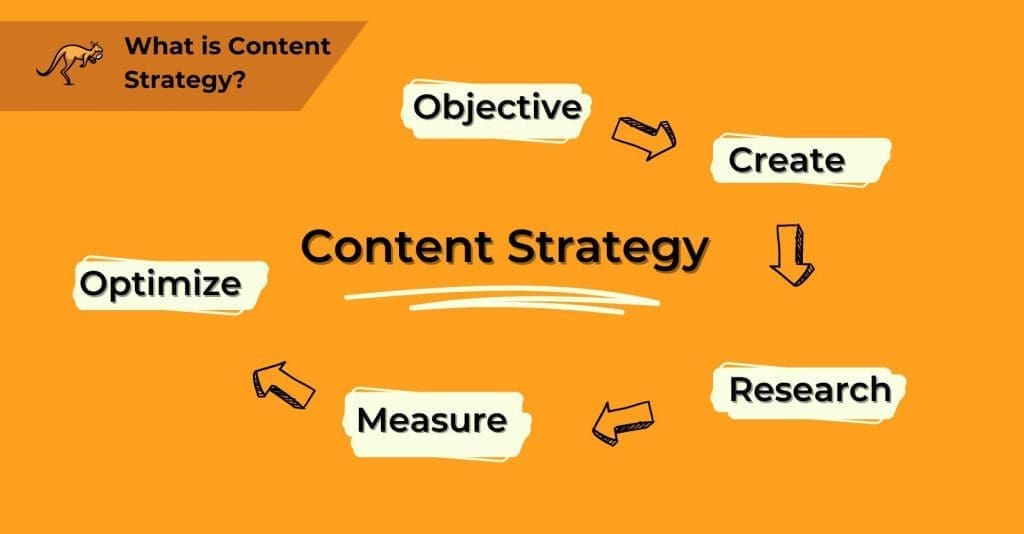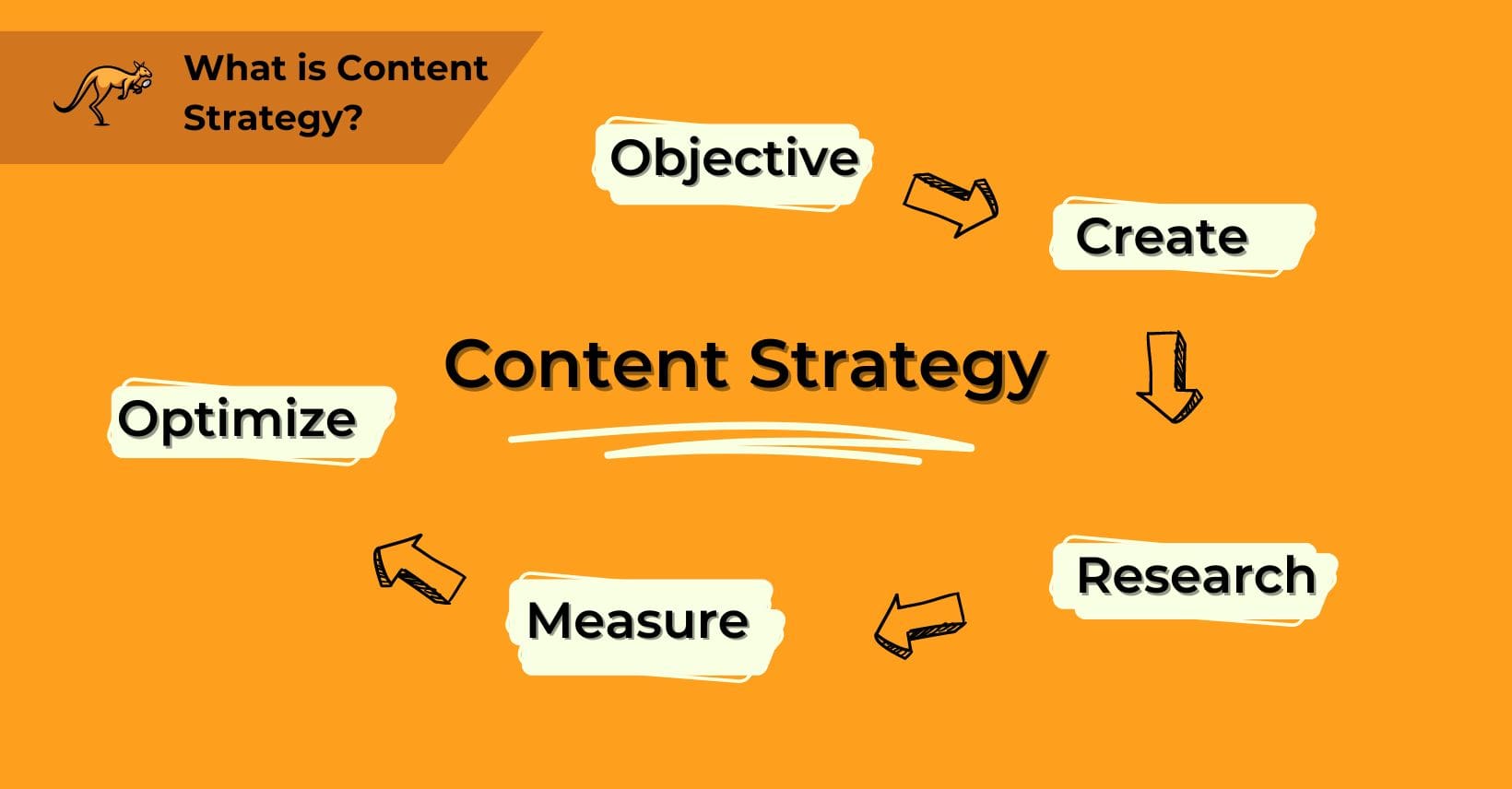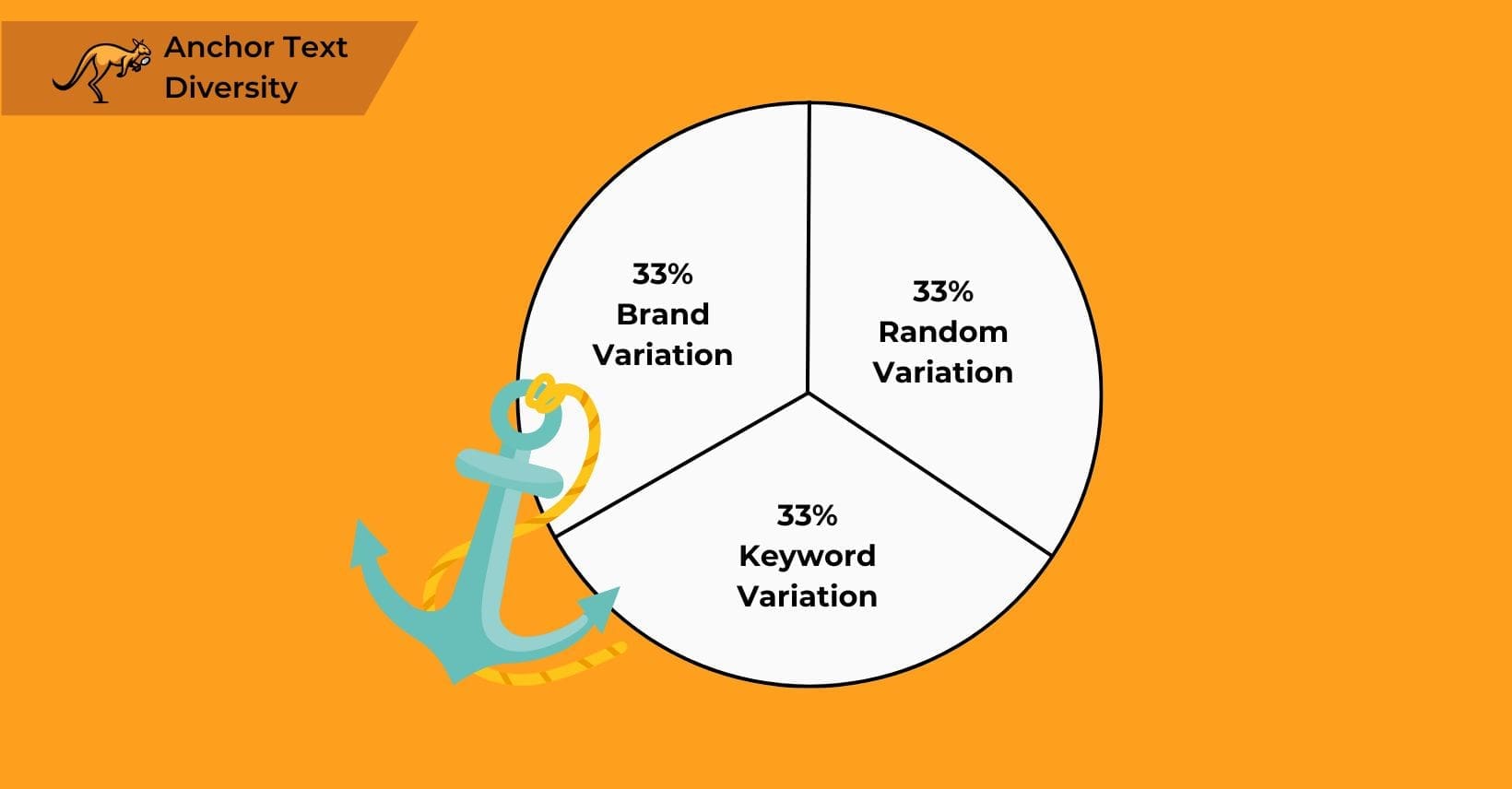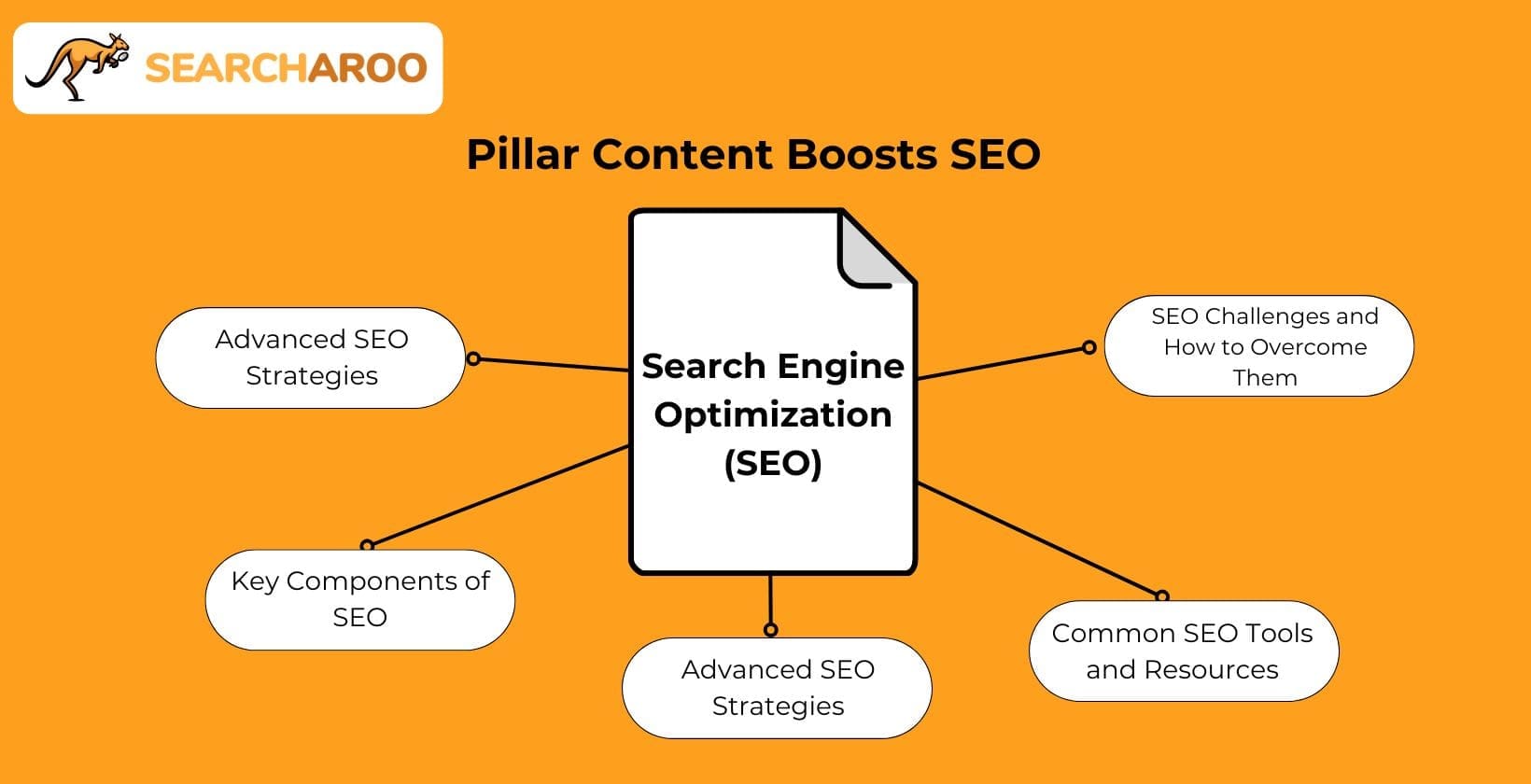As a business owner, you must focus on your brand for success. In today’s market, where online presence is crucial, improving your content marketing is key.
This involves posting content on platforms like social media and search engines.
To get noticed, offer something valuable to your audience, something unique.
Creating a content strategy for your brand is essential and requires continuous effort to perfect.
In this guide, we’ll explore everything you need to know about content and how to develop a strategy that achieves your business goals. But first, let’s delve into the core concept that drives it all.
What Is Content?

Before we go into a successful content marketing strategy, we must first understand what content is and its relevance to businesses today.
Content can take many forms, and business owners must grasp what this means for their brand and its broader impact.
Essentially, content refers to anything you publish online and is crucial for digital marketing.
Depending on your target audience and chosen platforms, various content formats may suit your needs. Regardless of the type of content, four main components should be consistent in everything you publish.
These are:
Information
One of the core elements of all high-quality content is the information you provide to your target audience.
Whether this information concerns your business, the services you provide, or your wider industry, valuable content will educate audiences. This does not mean content must be dry or boring, as information can be provided in many ways to ensure engagement.
Context
Context is important both when creating content and when marketing it, as it determines who it is for and what it can provide.
A key aspect of any content strategy framework will be the context behind all content, as this will affect everything else, from the audience to the platform and even the information provided within the content.
Platform
The best platform for your content will vary based on your potential customers and where they are most likely to be found online.
All content aims to increase organic traffic, bringing more people to your business so they can be led through the sales funnel and eventually bring in revenue through sales.
This will only be possible if you appear in the right places.
Most businesses create content for multiple platforms at once, including several social media channels.
Format
The content format will vary based on your chosen platform and market research findings. Online content can be audio, imagery, writing, or video. You need to create content that your audience can use and ensure it’s easy to distribute across all platforms, so considering the format is crucial.
This understanding directly impacts how you can align these choices with your business goals, guiding your next steps.
How Does This Apply To My Business Goals?
Knowing what’s needed for good content creation is key to boosting your online presence. A business’s content strategy markets to an audience without using traditional ads, proving highly effective. Digital content, like blog posts and social media, lets potential customers engage with your brand naturally, building a relationship that can lead to sales.
The sales funnel remains crucial, but how customers enter it has evolved. Content focusing on information and engagement captures customers better than push ads. It can meet them at various points in their buying process. While content creation primarily targets the Attract and Delight stages, it can also engage your audience at other points, driving more traffic to your site.
This approach highlights the importance of having a clear plan in place.
What Is Content Strategy?

Now that you understand what content is and what this means for your business, it is time to look into how you can take action.
Developing a content strategy is vital for success, attracting more customers, and boosting revenue for your brand. Content strategies link business goals with content ideas, planning how to use these ideas to increase organic traffic and gain more customers.
It’s a continuous process that needs regular attention to succeed. When executed well, a content strategy promotes your brand to the right audience, ensuring your business stands out.
Now that you understand what content is and what this means for your business, it is time to look into how you can take action.
What Makes Content Strategies?
Every content strategy starts with an overview of your business goals. Businesses develop corporate content strategies that align with these goals by documenting objectives, researching target audiences, and creating content that supports specific revenue targets. This keeps you focused when creating content and guides all marketing efforts, ensuring your brand follows the right path. Without this focus, content creation is just content, not a strategy; as a business, making money is the goal.
Understanding business goals is key to crafting an effective content strategy. Both the team and the audience should clearly understand these goals. While making money is a primary objective, true content optimization comes from a deeper understanding of your brand’s goals.
Even new business owners need to recognize their goals and how they influence their content strategy. Although content may not be the main focus initially, continually working on your content strategy builds a strong brand-customer relationship. Having a framework based on your brand’s main goals simplifies content creation.
These business goals guide the decisions in your content strategy and the content you produce. This approach’s positive impacts extend far beyond the content itself.
Benefits Of A Content Marketing Strategy

If you haven’t developed a content strategy, created a content calendar, or produced relevant content for your brand, you’re missing out on their potential benefits. A well-crafted content strategy can benefit every business, regardless of type or target audience.
These include:
Improved Online Visibility
There is a lot of online competition, and it can be difficult to stand out.
Even if you offer the highest-quality products or a wide range of services, other brands will always compete for the same customers, and you need more ways to stand out.
This is where your content strategy and content marketing come in.
A content strategy defines what kind of content you will create and where it is easier to remain consistent with this process. A business that consistently creates content will attract more customers, as there are more platforms to generate leads.
Planning ahead of time and giving yourself a wider image of your content tactics, such as a content calendar, makes it easier to reach these goals and publish content consistently. This then gives you more platforms to use within your marketing efforts.
Obtain More Leads and Customers
Content alone can increase the number of leads generated for your business, as each format you consider can draw in an audience and move them closer to the sales funnel.
As we have mentioned, consistency is key, which is why a plan is essential, but other elements also come into play. You need to consistently create relevant and engaging content for your audience.
The better the content, the more organic traffic it will obtain, and the more people will likely be pushed through the sales funnel.
A sound content strategy allows you to plan every social media or blog post, ensuring it meets your audience’s requirements and offers value. Quality content cannot be rushed or made on the spot, so a strategy is required to get the right attention.
Improves Brand Authority
If you continually produce quality content, you are actively contributing to your business’s reputation and increasing the authority of your brand voice.
While developing a good reputation can take a long time, a content strategy allows you to work on this and ensure you present your best face in your niche.
The more content you produce that remains informative and useful for your audience, the greater your authority will be within your industry. This is then used to develop trust between your brand and potential customers, who, over time, become familiar with your brand voice and will rely on your company over others.
Better Customer Engagement
Content marketing drives audience engagement by providing valuable information that resonates with your target audience’s needs and interests. Like developing a good reputation, your content strategy can also help you form a loyal customer base.
With regular content and engaging posts on social media, for example, you encourage your target audience to interact with your brand. Sharing your content or information not only results in better exposure for your business but can also contribute to successful marketing, such as through search engines to give you increased traffic.
The more your content is referenced on quality sites or social media, the better your search engine ranking will be, which in turn leads to greater traffic.
Increased Budget
With a solid plan, you can excel in content marketing and achieve greater results. More impressive numbers mean higher chances of securing a larger marketing budget. This potential resource boost allows for even more impactful strategies, opening the door to a stronger, more targeted approach.
A well-crafted strategy can be the key to unlocking these opportunities, ensuring you stay ahead and continually improve the effectiveness of your content.
How To Make A Content Strategy
You can excel in content marketing and achieve outstanding results with a solid plan. Better numbers lead to a higher chance of securing a larger marketing budget. This resource boost enables even more impactful strategies, paving the way for a stronger, more focused approach. A well-crafted strategy unlocks these opportunities, helping you stay ahead and continually improve your content’s effectiveness.
Content strategy research identifies audience needs and market trends, which informs an effective content plan by aligning your messaging with business objectives. To make the most of these strategies, knowing your direction is essential.
What Are Your Goals?
A deep understanding of business goals is essential in creating a content strategy and ensuring success.
When it comes to outlining the objectives of your business, it is a good idea to work within the SMART framework, which stands for:
- Specific
- Measurable
- Attainable
- Relevant
- Time Bound
This framework applies to the wider business and what you want to get from your content strategy. Making your business’s wider objectives actionable and specific within this framework can inform all ongoing decisions and provide a template for your content strategy.
What Goes Into Content Marketing?
You need to consider five key elements of any content strategy when making this plan for your business.
These elements are essential in ensuring successful content marketing, increased visibility, and more revenue for the business and make up the backbone of your content strategy. They are: /list
- Buyer Personas
Audience research plays a foundational role in developing an effective content strategy by revealing preferences, pain points, and consumption habits that shape content creation decisions. Conducting market research is the first step in almost anything you will do as a business owner, and this also applies to developing a content strategy.
Performing research and data analysis of your audience is required before you create content because it informs who is listening. Understanding who your audience is and what they want will inform all decisions regarding content creation and content marketing, including the kind of content you create, the platforms you use, and even your content schedule.
There are various ways that you can access your audience and determine who you are targeting with your content, such as:
- Survey existing customers
- Research industry trends and patterns
- Research competitors’ audiences
It is also a good idea to identify the customers you want to avoid, as this can help your content teams better understand who their work is aimed at and what kind of content they should produce.
Suppose you already have been working on content. In that case, you may also be able to use any existing content to see what kind of audience you already attract and determine whether this is something you want to continue working towards.
This information about your target audience can then be used to create an in-depth buyer persona, a specific document, or an outline that personifies your ideal consumer.
Within the persona, offer a few examples of age, interests, demographics, and desires for a business to create an in-depth document, which can then be used to support content creation. This persona gives your team something tangible to work towards, which can aid in improving content quality and relevance.
- Brand Story
Now that you understand your audience, it will be easier to develop an appealing brand story that can be used to inform your content strategy.
Your brand’s story will inform all the content you create and is a key aspect of developing your brand voice. Your brand voice needs to be consistent across all platforms to develop the right relationship with your audience.
From user-generated content to blog posts, all the content published by your business needs to be accurate to the brand story you are creating. The sales team will use this same story to maintain online traffic and ensure they get into the sales funnel.
A brand’s story is made up of the history of the company as well as the business’s mission, values, and overall purpose. This can be tailored to suit your audience persona and will inform everything within your content governance because all content needs to be relevant to the brand it represents.
Much like researching your audience, developing your brand story and ensuring it is relevant to these customers allows you to remain focused on your content strategy and create content that truly works for your goals.
- Content Marketing Mission Statement
Your mission statement will help ensure your content strategy remains focused on the business’s objectives. It includes not only the platforms you own and use for content, such as social media platforms, but also their purpose and how they offer value to your audience.
While most businesses have their social media platforms, you want to create processes to help your brand stand out, which can be highlighted in your mission statement.
Your business’s main focus and value set it apart from the rest. These will vary based on your audience and brand story. Determining these will give you some ideas regarding the benefits your content can provide over any other, as well as other information regarding platforms and formats.
Your mission statement should outline the values and benefits of your content strategy. This will help provide a focus for all content marketing and give the sales team a guide for how to best bring customers into the business.
- Documented Business Case
While you have been focusing on content marketing goals so far and have a good idea of the benefits you can provide when managing content, your content strategy needs to cover all bases.
This is where the documented strategy comes in, as this outlines not only the benefits of content marketing but also the risks and costs associated with this kind of plan.
A content strategy will not be complete without understanding the costs and how the benefits outweigh the risks in moving your business forward.
To develop this, a content audit may be required so you can see where traffic is coming from, the most successful search terms, and other elements that can inform content creation in the future. Weighing your current moves against the business’s goals can give a good insight into what else needs to be done and, therefore, where the costs and risks must apply.
Tools such as Google Analytics can be useful during your content audit. They can help you see how your business performs on search engines and gain insights into competitors. This process can also highlight any outdated social media or website content that needs to be removed for your new, better brand image.
Social media also needs to be considered during this research as it is most likely a huge part of your content strategy and will continue to be so even with these new insights.
Following this research, you can see which areas require additional attention, which brings in the most traffic, and where energy is wasted. All of this can be used to inform your content budget and the overall focus of the strategy moving forward.
For example, suppose a large percentage of your traffic comes from search results. In that case, you must account for search-engine-optimized content and the costs that come with this, such as writing, keyword research, and website performance.
- Action Plan
Create a content management system, like an editorial calendar, to outline your main marketing plans. This formal content plan offers a clear view of your business’s content strategy and upcoming projects. It helps plan content creation, marketing efforts, and additional costs while preparing your website for increased traffic from new campaigns.
Let’s see what key components your plan should include.
What To Include In Your Plan
The more information you can provide in your content plan, the easier it will be to implement and the better results you can expect. There are various things you need to include in this plan, with the main focus being:
Topics For Each Campaign
Create an outline for topics ahead of time to ensure that all the content you create is informative and valuable to your audience.
You want to ensure that you create unique but relevant content with each campaign, and outlining topics is a great way to stay focused.
Content Formats To Be Used
Using your insights from Google Analytics and the research you have performed, you can determine which kind of content is most successful for your brand.
The format can also vary based on the topic. For example, a video may be more useful than a blog post when it comes to explaining how your business works, as it is engaging, informative, and easy to understand.
Channels For Distribution
Using your research, identify the best platforms for your content. This varies based on where your audience interacts most, determined by their persona. The format of your content influences the ideal channels, as each platform has a unique focus that requires optimization for the best results. With this clarity, you can better organize your efforts and ensure consistent, timely content delivery. One way to stay on top of your schedule is by planning.
How To Make A Content Calendar
Once you have a content action plan, it’s time to schedule optimal publishing and promotion times. A content calendar contributes to an effective content strategy by organizing publication schedules, maintaining consistency, and aligning content with marketing campaigns and seasonal opportunities. Use a content or editorial calendar to coordinate with your team, ensuring everyone knows when campaigns go live and what to prioritize. As with your content strategy plan, include key elements in your calendar to keep you on track toward your goals.
These include:
Topics and Keywords
This keeps you focused on the kind of content you will be creating, as well as the research that is required.
Target Dates
You want to ensure that content is published consistently without overwhelming your audience.
Spacing out content based on topics also ensures that you are always providing value to your audience instead of repeating the same thing each time.
Headlines
Again, this can help keep you focused on the specific content and provide your creation team with insights into what they need to do beforehand.
Format
Choosing the format of content informs the creation process. It allows you to ensure you provide a good variety to your audience based on the platforms they use the most.
Audience Personas
While you have a generic audience persona for your customer base, it is also a good idea to have small groups or clusters within this to help keep each piece of content focused.
Highlighting the audience you are targeting on your calendar prevents repetition in content. It ensures you remain focused on your goals.
Success Metrics
Using past campaigns as a guide, you can also include the numbers you expect to see with each content release and use the calendar to track how successful your content has been since publication. Businesses measure content marketing engagement success through metrics such as page views, time on page, social shares, conversion rates, and comment frequency, which reveal how effectively content resonates with audiences.
How a Content Marketing Agency Enhances Your Content Strategy
Partnering with a content marketing agency can significantly elevate your content strategy by leveraging their expertise and experience. These agencies specialize in creating compelling, high-quality content that resonates with your target audience.
They handle comprehensive content planning, including keyword research and audience analysis, ensuring your content is timely, relevant, and optimized for search engines. Maintaining a consistent content schedule helps build and sustain audience engagement and loyalty.
At the same time, their creative approach ensures your brand stands out in a crowded marketplace.
Moreover, content marketing agencies enhance your SEO performance by implementing best practices and integrating them into your content strategy. They track performance metrics, providing insights for continuous improvement and optimization.
This data-driven approach ensures your content strategy is effective and aligned with your business goals.
Additionally, agencies manage the strategic distribution of your content across various platforms, maximizing its reach and impact. By outsourcing your content strategy, you can focus on other critical aspects of your business, knowing that experts are driving your content efforts to achieve optimal results.
Why Searcharoo is the Ideal Partner for Your Content Strategy
At Searcharoo, we pride ourselves on being the ideal partner for your content strategy by bringing our extensive expertise and innovative approaches. Our team of seasoned professionals specializes in crafting high-quality, engaging content tailored to resonate with your target audience.
We conduct thorough research to understand your market and audience, ensuring that our content aligns with your business goals and is optimized for maximum impact. Maintaining a consistent content schedule and incorporating the latest SEO best practices, we help you build a strong online presence and drive organic traffic to your website.
We also focus on performance tracking and data-driven optimization to ensure your content strategy remains effective and dynamic. We continuously refine our approach to meet your evolving needs by analyzing key metrics and providing actionable insights.
Our strategic distribution ensures that your content reaches the right audience through the most effective channels, maximizing its reach and impact. Partnering with Searcharoo means you can trust us to handle your content strategy expertly, allowing you to focus on other critical aspects of your business. At the same time, we help you achieve your marketing goals.
Wrapping Up Your Content Strategy Journey
To ensure success in today’s market, businesses need to stand out.
A content strategy helps businesses remain focused, gives them guidelines to work alongside when publishing content online, and ensures they can reach their goals using this technique. To understand what a PBN entails and its implications, click for more to access comprehensive insights into this powerful SEO technique.





